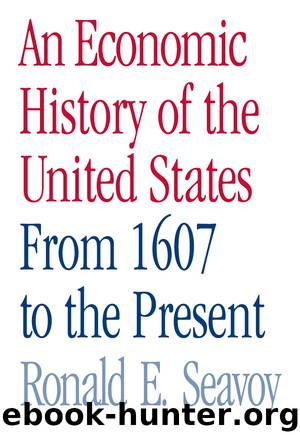An Economic History of the United States by Ronald E. Seavoy

Author:Ronald E. Seavoy
Language: eng
Format: epub
Publisher: Routledge
Banks and Currency
Preserving the agrarian bias of the national government had been a key policy of the political leaders of slave states. They had strongly supported retaining the independent treasury statute passed in 1846 because it forced the national government to conduct most of its business in cash. As long as the independent treasury operated, the finances of the national government were hand-to-mouth, and the national government was correspondingly weak. Political leaders in slave-labor states were determined to keep the national government financially weak because it reduced the ability of the northern majority to abolish slavery.
During 1861, the secretary of the treasury managed to mobilize sufficient credit to fund the military build-up, but it required one financial expedient after another. By the end of the year, the Suffolk System in New England and the free banking system of New York were strained to their capacities to mobilize credit for war use, and banking elsewhere in the United States was a morass of inefficiency. More credit had to be generated elsewhere. Elsewhere was the Legal Tender Act passed by Congress in February 1862.
Legal tender currency (greenbacks) was printing press money. It was passed because the secretary of the treasury had failed to present Congress with a comprehensive program of taxation. Printing paper currency was the only way of obtaining the requisite money to finance military operations. The statute authorized the treasury department to emit 150 million dollars of greenbacks. Interest was not paid on them. They were money because the national government said they were money.
Greenbacks were lawful money for paying all public and private debts, except interest on U.S. bonds and the tariff. These two payments had to be made with gold coins or in treasury notes that could be redeemed for gold coins. Insufficient tax revenues and the slow sale of bonds forced the secretary of the treasury to ask Congress to authorize an additional 150 million dollars in June 1862. Necessity forced the printing of more greenbacks because tax revenues and bond sales were inadequate during the rest of 1862; and by December the treasury was having difficulties accumulating enough money to pay soldiers. The solution was the emission of an additional 150 million dollars of greenback currency in March 1863.
Greenbacks were inherently inflationary. During the war, the value of greenbacks continually declined relative to gold. In 1862, on average, it took 113 greenbacks to purchase 100 dollar of gold coins; in 1863, 145 greenbacks; in 1864, 203; and in 1865, 157. Six percent U.S. bonds purchased with greenbacks earned almost 9 percent interest in 1863, over 12 percent interest in 1864, and over 9 percent in 1865, if the gold coins received in interest were converted into greenbacks. Conversion was widely practiced because greenbacks became the usual money of commerce.
During 1863, the secretary of the treasury encouraged the conversion of short-term interest bearing treasury notes and certificates of indebtedness into long-term bonds because they frequently circulated as currency and, like greenbacks, they were a source of inflation.
Download
This site does not store any files on its server. We only index and link to content provided by other sites. Please contact the content providers to delete copyright contents if any and email us, we'll remove relevant links or contents immediately.
Pale Blue Dot by Carl Sagan(5007)
The Rules Do Not Apply by Ariel Levy(4969)
Goodbye Paradise(3810)
Ogilvy on Advertising by David Ogilvy(3622)
Liar's Poker by Michael Lewis(3447)
Delivering Happiness by Tony Hsieh(3425)
Into Thin Air by Jon Krakauer(3399)
Purple Cow by Seth Godin(3203)
Rogue Trader by Leeson Nick(3043)
The Social Psychology of Inequality by Unknown(3030)
The Airbnb Story by Leigh Gallagher(2854)
4 - Harry Potter and the Goblet of Fire by J.K. Rowling(2702)
The Mind Map Book by Tony Buzan(2578)
Bossypants by Tina Fey(2532)
Claridge's: The Cookbook by Nail Martyn & Erickson Meredith(2404)
All the President's Men by Carl Bernstein & Bob Woodward(2377)
Six Billion Shoppers by Porter Erisman(2302)
Master of the Game by Sidney Sheldon(2290)
Alibaba by Duncan Clark(2083)
